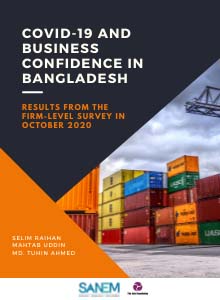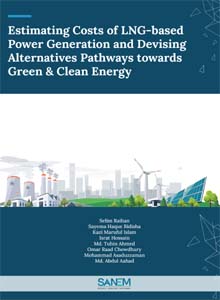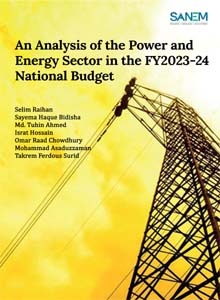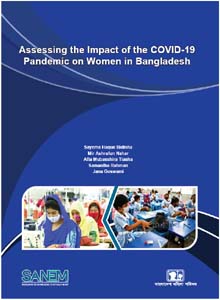
COVID-19 and Business Confidence in Bangladesh: Findings from the 2nd Round of Nationwide Firm-level Survey in October 2020
 Citation: Raihan, S., Uddin, M., Ahmed, M.T., (2020). “COVID-19 and Business Confidence in Bangladesh: Results from the Firm-level Survey in October 2020”, SANEM Publications, Dhaka, Bangladesh.
Citation: Raihan, S., Uddin, M., Ahmed, M.T., (2020). “COVID-19 and Business Confidence in Bangladesh: Results from the Firm-level Survey in October 2020”, SANEM Publications, Dhaka, Bangladesh.
Abstract: Since the onset of the crisis in early 2020, the COVID-19 pandemic continued its rampage on the global economy. Bangladesh also faced the backlashes of the economic turmoil induced by the pandemic. The adverse economic consequences of the crisis are still evident in depressed economic activities and domestic demand, decline or negligible recovery of certain industrial units, noticeable job losses along with fall in income. To combat the crisis, the Government of Bangladesh (GoB) announced generous incentive packages for the industries. In addition to such measures, during such an economic crisis, continuous monitoring of the private sector is warranted as it is one of the engines of economic growth. Against this backdrop, SANEM and The Asia Foundation jointly conducted the second round of the Business Confidence Index (BCI) survey on over 502 firms in Bangladesh in attempts to investigate attitudes and expectations of businesses on profitability, investment, wages, employment, business costs, and sales or exports, amongst others.
Out of the 502 firms surveyed under this study, 252 firms were from the manufacturing sector and 250 firms were from the services sector. Seven sub-sectors in the manufacturing industry and eight sub-sectors in the services industry were identified based on Bangladesh’s latest available National Accounts Statistics. The survey covers RMG, Textiles, Pharmaceuticals, Leather and Tannery, Light Engineering, Food-processing, etc. in the manufacturing sector. In the Services sector, this study covers Wholesales, Retails, Restaurants, Transport, ICT and Telecommunications, Financial Sectors, Real Estate, etc. The number of firms to be surveyed for each of the subsectors was chosen based on the sub-sectors’ contribution to the GDP.
Based on the survey responses, this study constructs three indices, namely – (i) Present Business Status Index in July-September 2020 compared to April-June 2019, (ii) Present Business Status Index in July-September 2020 compared to July-September 2019, and (iii) Business Confidence Index for October-December 2020 compared to July-September 2020. The indices are first prepared at the firm level and later aggregated to the sub-sectoral and sectoral level incorporating appropriate weights. Besides such indices measures, this study includes a section on stimulus packages that elaborates business thoughts on availability and effectiveness of incentive packages, barriers to access to the incentive packages, challenges of doing business as well as the overall business environment of the country.
There have been some visible improvements in overall business status in July-
September 2020 compared to the business status in April-June 2020. However, compared to the status in the same quarter of 2019, recovery is slow. Sectors are experiencing recovering at varying paces. Faster recovery is taking place in RMG, textile, pharma, food processing, retail, restaurants, financing sector, ICT. Slower recovery is being observed in leather, light engineering, wholesale, transport, and real estate.
The business confidence for October-December 2020 shows some improvement over business confidence in April-June 2020. The improvement is visible in all sub-components of BCI. But still, the overall BCI is low. At the sectoral level, despite the improvement, leather still demonstrates BCI of less than 50. BCIs in other sectors are in the range between 50 and 60.
Regarding the reach of the stimulus package, only 28 per cent of the surveyed firms have received some form of the stimulus package. Like in the first round of the survey, the major areas of challenges include unavailability of the package for the industry, lengthy procedure, difficulty in bank-related services, and difficulty in the information. There has not been any improvement in these areas. For a quicker and stronger economic recovery, effective implementation of the stimulus package is critically important.
Also, as demonstrated in the first round of the survey, no major improvement is seen in the case of the business cost. Indeed, many firms reported increased costs of the business in the second round of the survey. Corruption, poor trade logistics, unfavourable tax system, access to finance, and ineffective management of the COVID-19 health crisis appear to be other major challenges.
In this round of the survey, a new section was covered on the perception of economic recovery that includes the opinions of the business insiders regarding their perceptions on the economic recovery and the type of recovery that Bangladesh might have. While 71% of the surveyed firms think that Bangladesh is on the path to economic recovery, only 6% of them consider it as a strong recovery, and 57% and 37% think it as moderate and weak recovery respectively.



